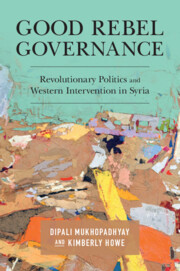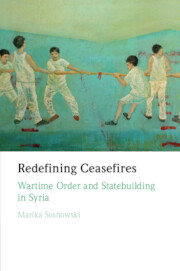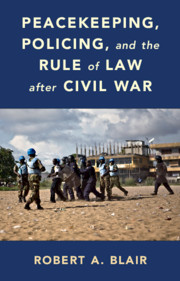Refine search
Actions for selected content:
24 results
9 - Termination of Civil War and Post-Conflict Challenges
-
- Book:
- Civil War and Intrastate Armed Conflict
- Published online:
- 29 May 2025
- Print publication:
- 12 June 2025, pp 290-318
-
- Chapter
- Export citation
1 - Introduction
- from Part I - Localized Peace Enforcement Theory
-
- Book:
- Local Peace, International Builders
- Published online:
- 02 January 2025
- Print publication:
- 16 January 2025, pp 3-21
-
- Chapter
-
- You have access
- Open access
- Export citation
Civil wars as critical junctures: Conceptual grounding and empirical potential
-
- Journal:
- Review of International Studies , First View
- Published online by Cambridge University Press:
- 10 December 2024, pp. 1-18
-
- Article
-
- You have access
- Open access
- HTML
- Export citation

Good Rebel Governance
- Revolutionary Politics and Western Intervention in Syria
-
- Published online:
- 01 June 2023
- Print publication:
- 15 June 2023
1 - Beyond Violence
-
- Book:
- Redefining Ceasefires
- Published online:
- 11 May 2023
- Print publication:
- 25 May 2023, pp 1-11
-
- Chapter
- Export citation
2 - Redefining Ceasefires in Civil War
-
- Book:
- Redefining Ceasefires
- Published online:
- 11 May 2023
- Print publication:
- 25 May 2023, pp 12-32
-
- Chapter
- Export citation

Redefining Ceasefires
- Wartime Order and Statebuilding in Syria
-
- Published online:
- 11 May 2023
- Print publication:
- 25 May 2023
Rethinking international intervention through coeval engagement: Non-formal youth education and the politics of improvement
-
- Journal:
- Review of International Studies / Volume 51 / Issue 3 / May 2025
- Published online by Cambridge University Press:
- 11 April 2023, pp. 523-544
- Print publication:
- May 2025
-
- Article
-
- You have access
- Open access
- HTML
- Export citation
1 - Introduction
- from Part I - Foundations
-
- Book:
- Undermining the State from Within
- Published online:
- 23 February 2023
- Print publication:
- 02 March 2023, pp 3-32
-
- Chapter
- Export citation
Desecuritisation, deradicalisation, and national identity in Afghanistan: Higher education and desecuritisation processes
-
- Journal:
- European Journal of International Security / Volume 7 / Issue 2 / May 2022
- Published online by Cambridge University Press:
- 25 November 2021, pp. 189-206
-
- Article
-
- You have access
- Open access
- HTML
- Export citation
10 - Conclusion
-
- Book:
- Governing for Revolution
- Published online:
- 05 March 2021
- Print publication:
- 18 March 2021, pp 258-279
-
- Chapter
- Export citation
Civil War and Citizens' Demand for the State: An Empirical Test of Hobbesian Theory
-
- Journal:
- British Journal of Political Science / Volume 52 / Issue 4 / October 2022
- Published online by Cambridge University Press:
- 08 March 2021, pp. 1748-1768
-
- Article
- Export citation
1 - “Experts in Decolonization”
-
- Book:
- France's Wars in Chad
- Published online:
- 03 December 2020
- Print publication:
- 17 December 2020, pp 14-60
-
- Chapter
- Export citation

Peacekeeping, Policing, and the Rule of Law after Civil War
-
- Published online:
- 09 November 2020
- Print publication:
- 05 November 2020
1 - Introduction
-
- Book:
- Peacekeeping, Policing, and the Rule of Law after Civil War
- Published online:
- 09 November 2020
- Print publication:
- 05 November 2020, pp 1-16
-
- Chapter
- Export citation
7 - Sub-national Evidence II: Evaluating the UN from the Bottom-Up
-
- Book:
- Peacekeeping, Policing, and the Rule of Law after Civil War
- Published online:
- 09 November 2020
- Print publication:
- 05 November 2020, pp 155-183
-
- Chapter
- Export citation
3 - Conceptual Framework: Civil War through a Legal Lens
-
- Book:
- Peacekeeping, Policing, and the Rule of Law after Civil War
- Published online:
- 09 November 2020
- Print publication:
- 05 November 2020, pp 32-59
-
- Chapter
- Export citation
8 - Sub-national Evidence III: UN Intervention and the Rule of Law in Liberia
-
- Book:
- Peacekeeping, Policing, and the Rule of Law after Civil War
- Published online:
- 09 November 2020
- Print publication:
- 05 November 2020, pp 184-218
-
- Chapter
- Export citation
2 - History of UN Intervention and the Rule of Law after Civil War
-
- Book:
- Peacekeeping, Policing, and the Rule of Law after Civil War
- Published online:
- 09 November 2020
- Print publication:
- 05 November 2020, pp 17-31
-
- Chapter
- Export citation
4 - Theoretical Framework: Restoring the Rule of Law after Civil War
-
- Book:
- Peacekeeping, Policing, and the Rule of Law after Civil War
- Published online:
- 09 November 2020
- Print publication:
- 05 November 2020, pp 60-89
-
- Chapter
- Export citation
